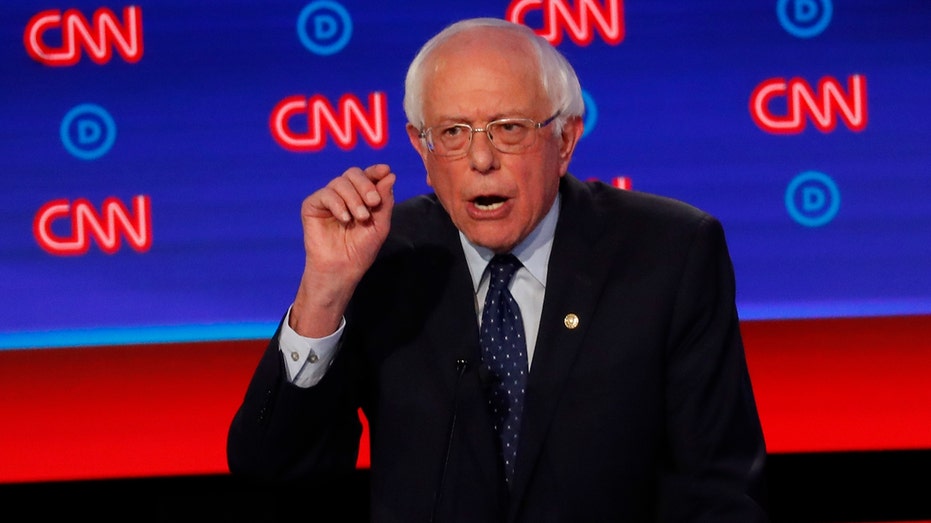Warren vs. Sanders on Medicare-for-all: How do their plans compare?
Senators Bernie Sanders and Elizabeth Warren, rivals for the Democratic presidential nomination, have unveiled sweeping, multi-trillion-dollar proposals to overhaul the country’s health-care system.
While the two lawmakers, who are jockeying for support among the party’s left-wing, are often viewed as the flipside of the coin — both are proponents of establishing a government-run health care system with no premiums, deductibles or copays — Sanders has tried to distance himself from the Massachusetts Democrats’ single-payer health-care system since she released it last Friday.
ELIZABETH WARREN'S MEDICARE-FOR-ALL PROPOSAL WOULD COST JEFF BEZOS $7 BILLION
On Sunday, during an interview with ABC News, Sanders took a stab at her recently released plan, which would cost the country "just under" $52 trillion, including $20.5 trillion in new federal spending, over the course of a decade. In her detailed outline, Warren called for new levies on the wealthy and a slew of other taxes to pay for the plan, including an “employer Medicare contribution,” which Sanders warned could harm workers’ wages and suppress job growth.
GET FOX BUSINESS ON THE GO BY CLICKING HERE
"The function of health care is to provide health care to all people, not to make $100 billion in profits for the insurance companies and the drug companies. So, Elizabeth Warren and I agree on that," Sanders's, a Vermont independent, said. "We do disagree on how you fund it. I think the approach that [I] have, in fact, will be much more progressive in terms of protecting the financial well-being of middle-income families."
The particular tax that Sanders took issue with was the $8.8 trillion contribution from employers, who would pay the government a slightly smaller percentage than they currently pay to provide health care to their workers.
CLICK HERE TO READ MORE ON FOX BUSINESS
“I think that that would probably have a very negative impact on creating those jobs, or providing wages, increased wages and benefits for those workers,” Sanders said. “So I think we have a better way, which is a 7.5 percent payroll tax, which is far more, I think, progressive because it’ll not impact employers of low wage workers but hit significantly employers of upper-income people.”
Here’s a closer look at how Warren and Sanders would pay for their sweeping proposals:

WARREN
- Taxes on additional take-home pay: Employees would no longer pay into their employer-sponsored health care, but would pay taxes on the extra take-home pay they receive under the new system.
- Taxes on the wealthy: The ultra-wealthy would be hit with a 6 percent tax on income over $1 billion — up from the currently proposed 3 percent — and capital gains income would be taxed annually, rather than at the time of sale. Combined, those proposals would culminate in $2 trillion in funding.
- Taxes on financial firms: A 35 percent tax would be imposed on American companies' overseas profits, while foreign companies would also be taxed based on their domestic sales, resulting in an additional $1.65 trillion in revenue.
- IRS crackdown: By expanding IRS enforcement and cracking down on tax evasion and fraud, the U.S. could realize about $2.3 trillion in additional federal revenue.
- Cut defense spending: Scaling back spending on the Pentagon would reallocate roughly $800 billion.
- Immigration overhaul: By creating a pathway to legal citizenship for undocumented immigrants, the U.S. could raise an estimated $400 billion.
- Employer Medicare contribution: Because employees would no longer pay health premiums or co-pays another $1.4 trillion in funding would be generated through taxing that portion of their income, which is deducted for premiums before federal tax is calculated.

SANDERS
- Payroll taxes on employers: Employers would pay a 7.5 percent payroll tax, replacing what they currently pay for health care. Right now, all employees and employers pay a 1.45 percent tax for Medicare, or 2.9 percent total. That would raise an estimated $3.9 trillion over 10 years. The first $2 million would be exempt from that tax in order to protect small businesses.
- Household premiums: Households earning more than $29,000 would pay a 4 percent income-based premium, generating $3.5 trillion over 10 years.
- Taxes on corporations: It would impose a one-time tax on currently held offshore profits, generating $767 billion over 10 years. Large financial institutions would also be hit with a fee, producing $117 billion.
- Taxes on the wealthy: Under the proposal, the marginal income tax rate would increase incrementally for those earning more than $250,000 — a 40 percent tax — to those earning more than $10 million — a 52 percent tax. Likewise, it would also end the tax break for capital gains and dividends on household income above $250,000. The wealthiest 0.1 percent, or 160,000 households, would also be hit with a wealth tax.




















